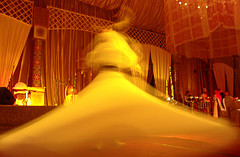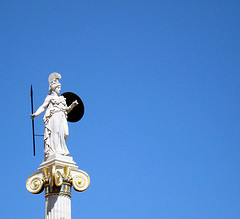Jul 24, 2011 3
Six Views of a Machine Gun
Inspired by Chuck Klostermann’s inspiring analysis of Led Zeppelin’s last performance at Knebworth. Thanks, Chuck.
1. Jimi Hendrix kicked off the last year of his life (1970) playing a series of shows at the Fillmore East with the Band of Gypsies. It is from one of these shows, recorded for posterity and released first as the album Band of Gypsies, that we have the definitive performance of his only overtly political song, “Machine Gun.” While the band played this song several times during their engagement, and Hendrix continued to play it until his death that September, this is the keeper:
2. When I was a kid, the off-handed political militancy of Jimi’s intro to this song was one thing that made it especially cool, even subversive and dangerous. Quoth Hendrix, “Happy New Year, first of all. I hope we have a million or two million more of them, if we can get over this summer [Foreshadowing!]. Ha, ha, ha. We’d like to dedicate this one to the draggin’ scene that’s going on: All the soldiers that are fighting in Chicago, Milwaukee, and New York. Oh, yes, and all the soldiers fighting in Vietnam. I’d like to do a thing called, ‘Machine Gun.'”
Now, Hendrix wasn’t particularly political and, if
Jul 20, 2011
Comments Off on Jimi Hendrix
I’ve been listening to Hendrix ever since I bought a 45 of “All Along the Watchtower” back in 1978. I’d like to write about the waxing and waning of my obsession with him but, instead, I’ll just post this video of his appearance with the original Experience in Stockholm in 1969: http://youtu.be/TeZ9OOAe1HoJimi Hendrix
Jul 11, 2011 3
More Ragged Glory and Wild Virtuosity
 In general, the guitarists I’ve liked the best tend to be kind of raggedy. Jimmy Page and Jimi Hendrix are perfect examples of this. Their playing was kind of sloppy, kind of slurry, and, at the edges, out of control. For some reason, to my ears, that has always sounded better than the textbook, super-fluid shredder (the best example of that being somebody like Al DiMeola).
In general, the guitarists I’ve liked the best tend to be kind of raggedy. Jimmy Page and Jimi Hendrix are perfect examples of this. Their playing was kind of sloppy, kind of slurry, and, at the edges, out of control. For some reason, to my ears, that has always sounded better than the textbook, super-fluid shredder (the best example of that being somebody like Al DiMeola).
I was thinking about this when I attended a bar mitzvah the other week. It was a very intimate and, as far as bar mitzvah’s go, very restrained and modest affair. The service was conducted in someone’s home by an Israeli rabbi with the assistance of a cantor lady.
My wife thought the cantor had a beautiful voice, and I guess it was in its way, but it was too perfect, too trained, really. I like to hear the human in a singing voice, and not simply pure notes generated by a disciplined vocal apparatus. It’s why I’ve tended to admire singers like Frank Sinatra or Scott Walker or, more recently, Karen Dalton.
It’s also why I prefer early sixties Coltrane (1960 European tour with Miles, 1961 Village Vanguard sets with Dolphy)—where he starts overblowing and veering into the noise—to the immediate, post-heroin sheets of sound you hear on Soultrane or the stuff with Monk at Carnegie Hall (recorded in ’57, discovered in 2005) or even Giant Steps.
It’s also why I’ve always preferred John McLaughlin (Inner Mounting Flame, Birds of Fire, Love Devotion Surrender, Emergency!, etc.) to DiMeola and Slayer to Metallica.
What do you prefer?
Photo Credit: Jungle_Boy
Nov 27, 2009 Comments Off on Hero-Worshiping Guitar Player
Hero-Worshiping Guitar Player
 When I was in college, I played music with a fellow named Tony Benoit. (If you’d like to read the text of an insightful and thought-provoking/action-recommending speech he gave on why we have environmental problems, you may do so now.)
When I was in college, I played music with a fellow named Tony Benoit. (If you’d like to read the text of an insightful and thought-provoking/action-recommending speech he gave on why we have environmental problems, you may do so now.)
We had a lot of far-ranging conversations about truth, life, art, girls, etc., but of the many things he said to me over the years, the one that stuck in my mind’s craw was the following rebuff, apropos of what I can not now recall, “That’s because you’re a hero-worshiping guitar player.” My friend had therewith hit a certain nail on it’s undeniable head and to this day I dwell on the implications of that sobriquet.
At the time, he was probably talking about my tendency to obsess about Jerry Garcia who was, in his way, my hero. Of course, I also idolized other guitar players, Jimi Hendrix, for example, or Jimmy Page, but Garcia meant something in particular to me at the time.
I had seen the Dead a bunch of times, and I had seen Jerry’s solo band here and there, so he was actually a living person to me (though, when he was playing at Frost in 1982, his ashen pallor had a from-the-grave-ness about it). But beyond that, I, like many of my Deadhead brethren and sisthren, saw in the band, and the figure of Garcia in particular, the living embodiment of a kind of ideal. While the precise contours of this ideal are lost in a vivid purple haze, broadly speaking I would define it as an ideal, not just of freedom, but of a willingness to use that freedom to explore the outer reaches of conscious human experience.
I think, however, Tony wasn’t just talking about my ongoing idolatry of rock stars like Garcia or Dylan or Neil Young. Instead, he was highlighting a more deeply ingrained part of my developing personality. If I admired someone for being extraordinary, and, frankly, I admired Tony in this way, I would see that individual as somehow essentially different from me and consider the qualities that made them uniquely special effectively unattainable.
Tony was trying to wake me up from this delusion. He was trying to remind me that people like Jerry, or, frankly, himself, were ultimately people just like me (or if they were different from me, they were no more different than everyone is from everyone else). As he told me once, “You know, if you could get into someone’s head and live there for awhile, I think you’d find that it’s pretty much like being in your own head.” (Of course, he also said, “When I die, I’ll finally get over this hang-up that I’m different from everything else.”)
Nowadays, while I still admire folks famous, not-so-famous, and downright unknown, I no longer place them in an aspirational realm forever beyond my grasp. No, I appreciate them in their “thusness” and don’t turn this thusness into a self-esteem-withering condemnation of my own thusness.
So, thanks, To(ny).
Image Courtesy of Αλεξάνδρα.